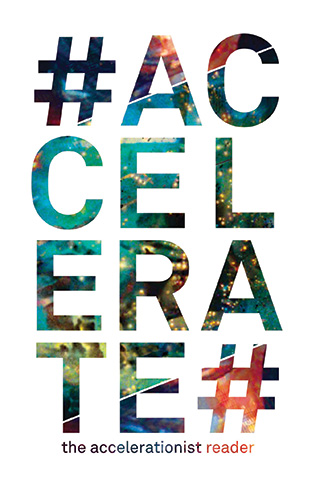Robin Mackay, Armen Avanessian (eds.), #Accelerate: The Accelerationist Reader (2014)
Filed under book | Tags: · accelerationism, capitalism, critique, cyberculture, labour, neoliberalism, politics, technology, theory

“Accelerationism is the name of a contemporary political heresy: the insistence that the only radical political response to capitalism is not to protest, disrupt, critique, or détourne it, but to accelerate and exacerbate its uprooting, alienating, decoding, abstractive tendencies.
#Accelerate presents a genealogy of accelerationism, tracking the impulse through 90s UK darkside cyberculture and the theory-fictions of Nick Land, Sadie Plant, Iain Grant, and CCRU, across the cultural underground of the 80s (rave, acid house, SF cinema) and back to its sources in delirious post-68 ferment, in texts whose searing nihilistic jouissance would later be disavowed by their authors and the marxist and academic establishment alike.
On either side of this central sequence, the book includes texts by Marx that call attention to his own ‘Prometheanism’, and key works from recent years document the recent extraordinary emergence of new accelerationisms steeled against the onslaughts of neoliberal capitalist realism, and retooled for the twenty-first century.
At the forefront of the energetic contemporary debate around this disputed, problematic term, #Accelerate activates a historical conversation about futurality, technology, politics, enjoyment and capital. This is a legacy shot through with contradictions, yet urgently galvanized today by the poverty of ‘reasonable’ contemporary political alternatives.”
Publisher Urbanomic, Falmouth, with Merve, Berlin, 2014
ISBN 9780957529557
536 pages
Reviews: Malcolm Harris (New Inquiry), J.J. Charlesworth (Art Review), Simon O’Sullivan (Mute), Alex Andrews (Review31), Orlando Read (Frieze).
Commentaries: McKenzie Wark (Public Seminar), David Cunningham (Radical Philosophy).
After Us: Art—Science—Politics, 1 (2015) [English/Spanish]
Filed under magazine | Tags: · accelerationism, aesthetics, art, artificial intelligence, machine, politics, science fiction

“Through essays, pictorials and fiction, After Us hopes to look beyond the horizon, exploring developments in science and technology, new forms and expressions in art, and alternative political thinking. In print and online.”
Contents: Essays by Nora N. Khan on artificial superintelligence, Liam Young on architecture for machines, Nick Srnicek on neoliberalism and aestheticism, Benedict Singleton on modern film archetypes. Interview with Walter Murch by Dave Tompkins. Fiction by Juan Mateos. Art by Timothy Saccenti & Sam Rolfes, Lawrence Lek. Illustrations by Stathis Tsemberlidis, Adam Ferriss, Alex Solman, Patrick Savile.
Publisher Optigram, London, Sep 2015
32 pages
HTML (English, use menu to browse contents)
PDF (English, 10 MB)
HTML (Spanish, expand menu item “translations” to browse contents)
See also Issue 2.
Comments Off on After Us: Art—Science—Politics, 1 (2015) [English/Spanish]Matteo Pasquinelli (ed.): Gli algoritmi del capitale. Accelerazionismo, macchine della conoscenza e autonomia del comune (2014) [Italian]
Filed under book | Tags: · accelerationism, algorithm, capitalism, philosophy, politics, theory

“L’immaginario politico e l’idea di futuro sembrano oggi cancellati dall’imperativo dell’austerity. Ma quale sarebbe il vero passaggio rivoluzionario, si chiedevano un tempo Deleuze e Guattari: ritirarsi dal mercato globale o, al contrario, andare ancora più lontano, “accelerare il processo”? L’economia è in crisi, ma la tecnologia continua a evolvere sotto i nostri occhi: i social network sono sempre più pervasivi, la logistica delle merci sempre più veloce e digitalizzata, servizi segreti e finanza usano algoritmi sempre più sofisticati per analizzare e prevedere i comportamenti di massa. E se l’impasse politica fosse legata all’incapacità di comprendere le nuove astrazioni del capitale e del lavoro, gli algoritmi che controllano le relazioni sociali tanto quanto il tempo collettivo congelato dalla finanza in futures e derivati? Un nuovo nomos tecnologico sembra prendere forma a livello planetario, dove i poteri tradizionali degli Stati nazione si intrecciano con le grandi corporation della rete. Un ex direttore della Cia lo ha riassunto in modo cinico ma efficace: “Uccidiamo persone sulla base dei metadati”. Rispondendo al recente Manifesto accelerazionista e rilanciando la tesi del capitalismo cognitivo, gli autori del presente libro sostengono che lo sviluppo tecnologico possa essere ridisegnato in senso rivoluzionario, che l’astrazione più estrema dell’intelligenza debba diventare arma politica e che il futuro sia da riconquistare come terreno visionario.”
Contributors: Alex Williams & Nick Srnicek, Antonio Negri, Franco “Bifo” Berardi, Matteo Pasquinelli, Nick Dyer-Witheford, Mercedes Bunz, Stefano Harney, Tiziana Terranova, Carlo Vercellone, and Christian Marazzi.
Publisher Ombrecorte, Verona, 2014
ISBN 9788897522829
187 pages
Reviews: Andrea Fumagalli (Il manifesto, 2014), Valerio Mattioli (Prismo, 2015), Elettra Stimilli (Alfabeta2, 2015).
Comment (0)
